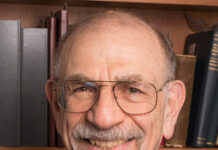By Rabbi Alana Suskin
Special to WJW
This week’s Torah portion is Vayakhel, Exodus 35:1-38:20.
Vayakhel describes gathering materials for and making the mishkan, the tabernacle. As God, through Moses, gives instructions, something unusual is unveiled through the language: the word “lev” (heart) appears 14 times. That it appears as a multiple of seven — a number of completeness — signals that there’s something important going on.
There are three “lev” compound words: nadiv-lev — generous-hearted; chacham-lev — wise-hearted; “nisa-lev” — whose heart is aroused in them (and only once does “lev” appear by itself).
These heart words describe different people and activities. The nadiv-lev/generous of heart are the ones contributing resources willingly to the project. Nisa-lev describes how excited people are to do the work or give gifts.
The third lev is different. Chacham-lev refers to the men, women (unusual in itself) and leaders of this project, Bezalel and Oholiav. One might think that in the context of the portion the words refer only to skill, but the tradition actually extends it much further. Bezalel is specifically named to lead this enterprise not only because he is a gifted craftsman, but also because he is spiritually on a very high level (BT Berachot 55a). His “wise-heart” means not only skill, but ethical grounding, fear of heaven and intellectual knowledge.
Although in American society, we think of wisdom as an intellectually based trait, it’s clear from the context in this portion and elsewhere that Judaism has a deeper definition. Not only does the tradition see wisdom differently than surrounding cultures, it’s self-aware about doing so. In the Talmud (Berachot 58a), the sages specify distinct blessings for Jewish scholars and non-Jewish ones: for the former, one says “Blessed is the One who shared God’s wisdom with those who fear/have reverence for God”; for the latter, “Blessed is the One who has given God’s wisdom to flesh and blood [humans].”
Someone who is chacham-lev has more than just skill or knowledge or even deep understanding; to be chacham-lev is to be truly wise because one is deeply ethical as well. Pirkei Avot 3:9 states: “Anyone whose fear of sin precedes their wisdom, their wisdom endures. And anyone whose wisdom precedes their fear of sin, their wisdom does not endure. He would [also] say: Anyone whose actions are more plentiful than their wisdom, their wisdom endures. And anyone whose wisdom is more plentiful than their actions, their wisdom does not endure.”
To be chacham-lev/wise-hearted requires not only dedication to knowledge and skill, but also that the knowledge and skill are grounded in decency and moral behavior. And this has two components: that one understands intellectually what moral behavior is and that one’s actions reflect that understanding.
There are a great many people whom we think of as smart. But as is implicit in the blessings and Pirkei Avot, if their actions and thoughts aren’t grounded in decency, if they don’t use their intellectual ability to generate consistent positive action and avoid unethical behavior, even their positive achievements will not last. The implication is that in a society that values cleverness unbounded by rules of morality, intellectual achievements will lead us to act in ways that do harm to others. And there is vast historic evidence for this, whether we’re speaking of the Tuskeegee “study,” Nazi medical experimentation or just everyday people justifying their own bad behavior through arrogance about their own cleverness. The sages spent an enormous amount of time discussing the pitfalls of arrogance — and especially of people who think themselves clever and do “whatever is right in their own eyes” — and how that leads to evil.
In contrast, the chacham-lev is truly to be admired. Their skills are dedicated toward a larger vision, and they know that their actions must be shaped by moral vision. Thus when they think and when they act, the fusion of skill, intellect and morality provides true leadership, and “their wisdom endures.”
Rabbi Alana Suskin is managing editor of Jewschool.com.





